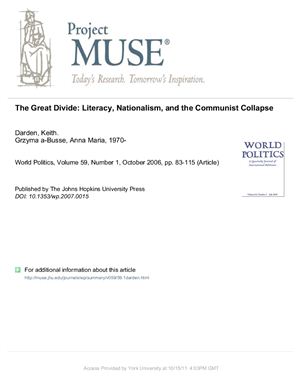World Politics, Volume 59, Number 1, October 2006, pp. 83-115
(Article)
Published by The Johns Hopkins University Press
DOI: 10.1353/wp.2007.0015
WHY do some goveing parties, closely associated with a collapsed
authoritarian regime, nonetheless retain power and continue
to gove? This paradoxical outcome occurred in 45 percent of
countries of the former Soviet Union and its satellites. In some of these
countries the fi rst free elections retued the Communist Party to rule,
while in others unreconstructed communists retained power and free
elections were never held. In the remaining 55 percent, however, communist
parties lost the fi rst free elections and exited power completely.
Published by The Johns Hopkins University Press
DOI: 10.1353/wp.2007.0015
WHY do some goveing parties, closely associated with a collapsed
authoritarian regime, nonetheless retain power and continue
to gove? This paradoxical outcome occurred in 45 percent of
countries of the former Soviet Union and its satellites. In some of these
countries the fi rst free elections retued the Communist Party to rule,
while in others unreconstructed communists retained power and free
elections were never held. In the remaining 55 percent, however, communist
parties lost the fi rst free elections and exited power completely.

